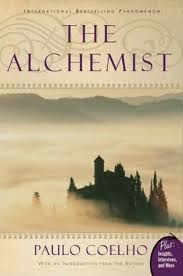"Maktub," the merchant said, finally.
"What does that mean?"
"You would have to have been born an Arab to understand," he answered. "But in your language it would be something like, 'It is written.'"
This word is basically equivalent to destiny/fate. Much like the Greek concept of the Moirai with their thread of life, the crystal merchant(and at some moments Santiago) believes that destiny governs everything from chance encounters to suffering. It reminds me of the choose your own adventure books I read when I was in middle school. Based on the choice you make, the destiny is already predetermined. You have many choices, but a cause and effect scenario still exists. For Santiago, all of his choices are leading him down a particular path to find his personal legend. It is a basic human question: Why do I exist? Writers and philosophers would have little to discuss if this question did not burn at the psyche of a majority of humanity. Holden struggles with this same issue in Catcher in the Rye while he suffers from survivor guilt after his brother dies.



